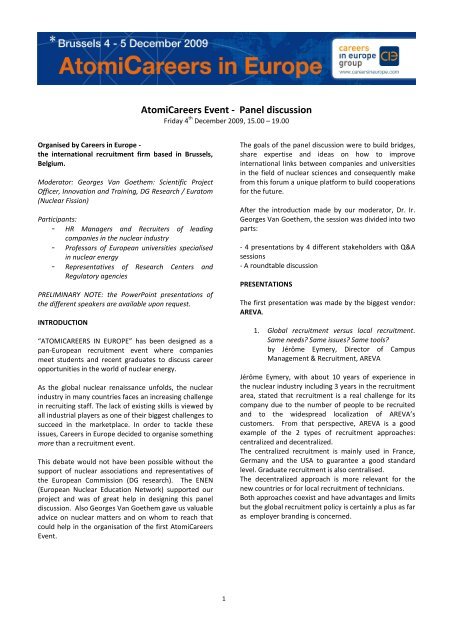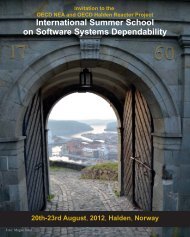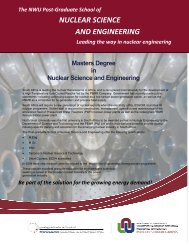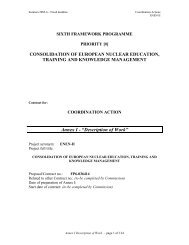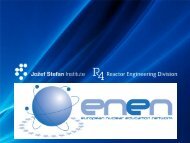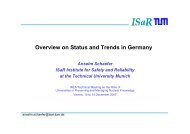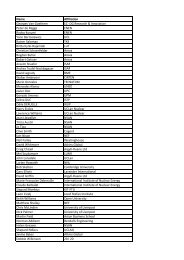Minutes on the Panel discussion - ENEN Association
Minutes on the Panel discussion - ENEN Association
Minutes on the Panel discussion - ENEN Association
You also want an ePaper? Increase the reach of your titles
YUMPU automatically turns print PDFs into web optimized ePapers that Google loves.
AtomiCareers Event - <strong>Panel</strong> discussi<strong>on</strong><br />
Friday 4 th December 2009, 15.00 – 19.00<br />
Organised by Careers in Europe -<br />
<strong>the</strong> internati<strong>on</strong>al recruitment firm based in Brussels,<br />
Belgium.<br />
Moderator: Georges Van Goe<strong>the</strong>m: Scientific Project<br />
Officer, Innovati<strong>on</strong> and Training, DG Research / Euratom<br />
(Nuclear Fissi<strong>on</strong>)<br />
Participants:<br />
- HR Managers and Recruiters of leading<br />
companies in <strong>the</strong> nuclear industry<br />
- Professors of European universities specialised<br />
in nuclear energy<br />
- Representatives of Research Centers and<br />
Regulatory agencies<br />
PRELIMINARY NOTE: <strong>the</strong> PowerPoint presentati<strong>on</strong>s of<br />
<strong>the</strong> different speakers are available up<strong>on</strong> request.<br />
INTRODUCTION<br />
“ATOMICAREERS IN EUROPE” has been designed as a<br />
pan-European recruitment event where companies<br />
meet students and recent graduates to discuss career<br />
opportunities in <strong>the</strong> world of nuclear energy.<br />
As <strong>the</strong> global nuclear renaissance unfolds, <strong>the</strong> nuclear<br />
industry in many countries faces an increasing challenge<br />
in recruiting staff. The lack of existing skills is viewed by<br />
all industrial players as <strong>on</strong>e of <strong>the</strong>ir biggest challenges to<br />
succeed in <strong>the</strong> marketplace. In order to tackle <strong>the</strong>se<br />
issues, Careers in Europe decided to organise something<br />
more than a recruitment event.<br />
This debate would not have been possible without <strong>the</strong><br />
support of nuclear associati<strong>on</strong>s and representatives of<br />
<strong>the</strong> European Commissi<strong>on</strong> (DG research). The <strong>ENEN</strong><br />
(European Nuclear Educati<strong>on</strong> Network) supported our<br />
project and was of great help in designing this panel<br />
discussi<strong>on</strong>. Also Georges Van Goe<strong>the</strong>m gave us valuable<br />
advice <strong>on</strong> nuclear matters and <strong>on</strong> whom to reach that<br />
could help in <strong>the</strong> organisati<strong>on</strong> of <strong>the</strong> first AtomiCareers<br />
Event.<br />
The goals of <strong>the</strong> panel discussi<strong>on</strong> were to build bridges,<br />
share expertise and ideas <strong>on</strong> how to improve<br />
internati<strong>on</strong>al links between companies and universities<br />
in <strong>the</strong> field of nuclear sciences and c<strong>on</strong>sequently make<br />
from this forum a unique platform to build cooperati<strong>on</strong>s<br />
for <strong>the</strong> future.<br />
After <strong>the</strong> introducti<strong>on</strong> made by our moderator, Dr. Ir.<br />
Georges Van Goe<strong>the</strong>m, <strong>the</strong> sessi<strong>on</strong> was divided into two<br />
parts:<br />
- 4 presentati<strong>on</strong>s by 4 different stakeholders with Q&A<br />
sessi<strong>on</strong>s<br />
- A roundtable discussi<strong>on</strong><br />
PRESENTATIONS<br />
The first presentati<strong>on</strong> was made by <strong>the</strong> biggest vendor:<br />
AREVA.<br />
1. Global recruitment versus local recruitment.<br />
Same needs Same issues Same tools<br />
by Jérôme Eymery, Director of Campus<br />
Management & Recruitment, AREVA<br />
Jérôme Eymery, with about 10 years of experience in<br />
<strong>the</strong> nuclear industry including 3 years in <strong>the</strong> recruitment<br />
area, stated that recruitment is a real challenge for its<br />
company due to <strong>the</strong> number of people to be recruited<br />
and to <strong>the</strong> widespread localizati<strong>on</strong> of AREVA’s<br />
customers. From that perspective, AREVA is a good<br />
example of <strong>the</strong> 2 types of recruitment approaches:<br />
centralized and decentralized.<br />
The centralized recruitment is mainly used in France,<br />
Germany and <strong>the</strong> USA to guarantee a good standard<br />
level. Graduate recruitment is also centralised.<br />
The decentralized approach is more relevant for <strong>the</strong><br />
new countries or for local recruitment of technicians.<br />
Both approaches coexist and have advantages and limits<br />
but <strong>the</strong> global recruitment policy is certainly a plus as far<br />
as employer branding is c<strong>on</strong>cerned.<br />
1
From left to right : Prof. Dr Hamid Ait Abderrahim, Mr. Stéphane Wajskop, Dr. Ir. Georges Van Goe<strong>the</strong>m, Mr. Jérôme Eymery and Dr. Joseph Safieh<br />
Jérôme Eymery’s main message is that that <strong>the</strong>re is no<br />
unique soluti<strong>on</strong> to recruit in <strong>the</strong> nuclear field: <strong>the</strong> tools<br />
and policies have to be adapted to <strong>the</strong> profiles,<br />
businesses and markets.<br />
Through <strong>the</strong> Q&A sessi<strong>on</strong>, Jérôme Eymery described <strong>the</strong><br />
type of profiles AREVA recruits. Am<strong>on</strong>g <strong>the</strong> 10.000 new<br />
recruits in 2009, about 4000 (all kind of profiles) were<br />
recruited in France. Am<strong>on</strong>g those 4000, about 2500<br />
were engineers or technicians, of which about 700 were<br />
young graduates. Am<strong>on</strong>g all those new engineers, <strong>on</strong>ly<br />
10% were nuclear profiles with sometimes no<br />
experience in <strong>the</strong> field yet, lots had a mechanical<br />
background. Jérôme Eymery c<strong>on</strong>firmed that AREVA<br />
could not stick to <strong>on</strong>ly nuclear profiles as <strong>the</strong>re is a<br />
shortage <strong>on</strong> those profiles.<br />
It was also said that <strong>the</strong> bad image of <strong>the</strong> nuclear energy<br />
in Germany had a str<strong>on</strong>g impact <strong>on</strong> recruitment in <strong>the</strong><br />
country. As <strong>the</strong>re are <strong>on</strong>ly very few “nuclear” university<br />
programmes , AREVA has to look for engineers in o<strong>the</strong>r<br />
fields. Ano<strong>the</strong>r AREVA’s difficulty in Germany is that its<br />
brand is less known than RWE or E.ON’s.<br />
Petre Gi<strong>the</strong>scu, professor at <strong>the</strong> Polytechnic University<br />
of Bucharest commented that AREVA’s focus seemed to<br />
be <strong>on</strong> countries where it runs projects and was<br />
w<strong>on</strong>dering whe<strong>the</strong>r AREVA was intending to expand its<br />
partnerships with universities to o<strong>the</strong>r countries.<br />
Jérôme Eymery replied that AREVA initiated some<br />
partnerships in new countries like Poland for instance<br />
but that <strong>the</strong> main focus was <strong>on</strong> <strong>the</strong>ir main markets.<br />
The issue of mobility across countries was also raised.<br />
In France, AREVA is sometimes using a sort of “training<br />
passport” to recruit experts from o<strong>the</strong>r countries for<br />
whom <strong>the</strong>y need a proof of <strong>the</strong>ir high technical skills.<br />
But this training passport is not really used in o<strong>the</strong>r<br />
countries and does not have a str<strong>on</strong>g impact <strong>on</strong><br />
mobility.<br />
After <strong>the</strong> point of view of <strong>the</strong> vendor side, we gave <strong>the</strong><br />
word to Utilities represented by E.ON.<br />
2. In-house corporate training to face skills<br />
shortage, E.ON Graduate Program and E.ON<br />
Supports Ing. Students (E.SIS)<br />
by Despina Kalfas, HR Manager & Dr Michael<br />
Fuchs, Head of Technology, E.ON Energie AG<br />
Mrs Kalfas started with a presentati<strong>on</strong> of E.ON business<br />
and its different units and Dr Fuchs summarised E.ON’s<br />
recruitment situati<strong>on</strong>.<br />
Dr Fuchs explained that Germany, Finland, UK, France,<br />
Italy and Sweden are major target countries today for<br />
E.ON. On <strong>the</strong> <strong>on</strong>e hand, E.ON is looking for staff to build<br />
<strong>the</strong> new plants in Finland and <strong>the</strong> UK for instance, and,<br />
<strong>on</strong> <strong>the</strong> o<strong>the</strong>r hand, in Germany, E.ON has to replace a<br />
generati<strong>on</strong> of staff that is retiring so<strong>on</strong> and <strong>the</strong>refore all<br />
kinds of skills are needed in <strong>the</strong> business units and <strong>the</strong><br />
headquarters. Also some of <strong>the</strong> mechanical comp<strong>on</strong>ents<br />
in nuclear plants have to be changed and accordingly do<br />
<strong>the</strong> mechanical skills and o<strong>the</strong>r specific skills: e.g.:<br />
materials ageing, stress corrosi<strong>on</strong>, etc...<br />
Dr Michael Fuchs menti<strong>on</strong>ed <strong>the</strong> fact that <strong>on</strong>e of E.ON<br />
biggest issues was <strong>the</strong> replacement of Instrumentati<strong>on</strong><br />
and C<strong>on</strong>trol (I&C) equipment. As, after 20 years, spare<br />
parts cannot be found anymore, E.ON is facing a change<br />
from analogue to digital I&C with <strong>the</strong> required<br />
adaptati<strong>on</strong> of skills.<br />
He commented as well that fortunately <strong>the</strong> political<br />
climate and <strong>the</strong> image of <strong>the</strong> nuclear field in Germany<br />
changed a little for <strong>the</strong> better. In 2003, <strong>on</strong>ly <strong>on</strong>e<br />
student graduated from nuclear sciences. In 2004, <strong>the</strong>re<br />
were two students and <strong>the</strong>y got directly into jobs made<br />
for experts (amazing career path linked to talent<br />
shortage!). Nowadays <strong>the</strong>re are about a couple of<br />
hundreds thanks to <strong>the</strong> chairs and special institutes that<br />
were recently set up.<br />
2
Despina Kalfas described two specific programmes<br />
developed by E.ON designed for young graduates and<br />
engineering students to face <strong>the</strong> skills shortage:<br />
- E.ON Graduate Programme (E.ON Supporting<br />
students): enables young graduates to get to<br />
know <strong>the</strong> E.ON Group from various<br />
perspectives and in different countries. All<br />
graduates entering <strong>the</strong> E.ON Graduate<br />
Programme are offered a job in E.ON<br />
afterwards.<br />
- E.SIS is a student scholarship programme<br />
supporting engineering students (energy<br />
management, mechanical, structural,<br />
industrial, electrical and process engineering<br />
etc.)… through educati<strong>on</strong>al grants, career<br />
guidance, support <strong>on</strong> Master <strong>the</strong>sis, practical<br />
assignments and network events.<br />
The Q&A sessi<strong>on</strong> highlighted <strong>the</strong> fact that most of <strong>the</strong><br />
new hires in <strong>the</strong> nuclear sector are coming from parallel<br />
disciplines and <strong>the</strong>refore need an additi<strong>on</strong>al training.<br />
On-<strong>the</strong>-job training is also provided to technological<br />
profiles by giving <strong>the</strong>m a specific area of resp<strong>on</strong>sibility.<br />
Dr Michael Fuchs insisted <strong>on</strong> <strong>the</strong> fact that all types of<br />
engineers are suitable except for positi<strong>on</strong>s related to<br />
‘safety’ where <strong>the</strong> need goes really to people with a<br />
nuclear background.<br />
During <strong>the</strong> sessi<strong>on</strong>, Ir PhD Radek Skoda, professor at <strong>the</strong><br />
Czech Technical University, raised <strong>the</strong> questi<strong>on</strong> of<br />
aggressive recruitment. He was w<strong>on</strong>dering whe<strong>the</strong>r<br />
E.ON could do something not to lose valuable<br />
candidates ‘sharked’ away by <strong>the</strong> financial world.<br />
Despina Kalfas explained that E.ON was looking for<br />
people passi<strong>on</strong>ate about <strong>the</strong> nuclear power industry and<br />
that she had no problem to let people more interested<br />
in m<strong>on</strong>ey go to o<strong>the</strong>r sectors.<br />
To <strong>the</strong> questi<strong>on</strong> <strong>on</strong> <strong>the</strong> need to be fluent in German to<br />
work at E.ON, her reply was that German was a must for<br />
positi<strong>on</strong>s in power plants but not elsewhere.<br />
Talking about specific positi<strong>on</strong>s for nuclear background<br />
people <strong>on</strong>ly,<br />
Dr Ir Georges Van Goe<strong>the</strong>m was w<strong>on</strong>dering whe<strong>the</strong>r<br />
o<strong>the</strong>r than I&C profiles were critical, like System and<br />
Process Engineering, Heating, Venting and Air<br />
C<strong>on</strong>diti<strong>on</strong>ing (HVAC),…<br />
At E.ON, HVAC is not really critical but ‘materials ageing’<br />
is critical because of <strong>the</strong> planned life extensi<strong>on</strong> of power<br />
plants as <strong>the</strong>re is a need for new operating materials for<br />
changing c<strong>on</strong>diti<strong>on</strong>s.<br />
The last questi<strong>on</strong> to E.ON was asked by Le<strong>on</strong> Cizelj,<br />
professor at <strong>the</strong> Institut "Jožef Stefan", regarding <strong>the</strong><br />
"European Nuclear Energy Leadership Academy"<br />
(ENELA, to be launched in January 2010) and its<br />
necessity because according to him <strong>the</strong>re were already<br />
enough universities but not enough students. On this,<br />
Dr Michael Fuchs simply replied that this Nuclear<br />
Academy, supported by six companies am<strong>on</strong>g which<br />
E.ON is targeting post-graduate employees with high<br />
potential and was not focusing <strong>on</strong> basic nuclear skills<br />
taught in university programs.<br />
After listening to <strong>the</strong> Utilities sector, we gave <strong>the</strong> word<br />
to ano<strong>the</strong>r stakeholder, i.e. Research Centers with <strong>the</strong><br />
presentati<strong>on</strong> of Prof. Dr Hamid Ait Abderrahim from <strong>the</strong><br />
SCK CEN (Mol).<br />
3. What is <strong>the</strong> recruitment situati<strong>on</strong> in <strong>the</strong><br />
“research” envir<strong>on</strong>ment<br />
by Prof. Dr Hamid Ait Abderrahim, Institute<br />
Manager, Advanced Nuclear Systems, SCK CEN<br />
Prof. Dr. Hamid Ait Abderrahim first c<strong>on</strong>firmed <strong>the</strong><br />
percentage of nuclear profiles recruited in general, i.e.<br />
10 to 15%. According to him, research centres are also<br />
attractive to young talents because <strong>the</strong>y are an<br />
innovati<strong>on</strong> engine.<br />
Prof. Dr Hamid Ait Abderrahim gave some examples of<br />
SCK CEN “innovative projects”, e.g. advanced PWR, Mox<br />
fuel, or <strong>the</strong> <strong>on</strong>going Myrrha project. To succeed in this<br />
kind of projects, SCK CEN invests in <strong>the</strong> R&D<br />
infrastructure which leads to <strong>the</strong> creati<strong>on</strong> of new job<br />
opportunities. Talents are attracted by novelty and<br />
challenge and talented young potentials are able to<br />
c<strong>on</strong>duct high level PhDs at SCK CEN, building <strong>the</strong>ir<br />
career <strong>the</strong>re.<br />
In additi<strong>on</strong> to this, <strong>the</strong> SCK CEN toge<strong>the</strong>r with 6 Belgian<br />
universities created <strong>the</strong> BNEN (Belgian Nuclear Higher<br />
Educati<strong>on</strong> Network) that grants a degree called “Master<br />
in Nuclear Engineering”. This programme is taught at<br />
SCK CEN taking advantage of its infrastructure. O<strong>the</strong>r<br />
Programmes are also offered, i.e. PhD’s, post doc<br />
programmes, tailored courses, trainings, seminars, etc…<br />
Prof. Dr Hamid Ait Abderrahim’s speech <strong>the</strong>n presented<br />
ano<strong>the</strong>r research institute: <strong>the</strong> KIT (“Karlsruhe Institute<br />
3
of Technology”) <strong>on</strong> behalf of Dr Joachim Knebel, Head of<br />
Program Nuclear Safety Research, who could not attend<br />
<strong>the</strong> Event.<br />
The KIT results from <strong>the</strong> merger of <strong>the</strong> “Technical<br />
University of Karlsruhe” with a nati<strong>on</strong>al research centre:<br />
<strong>the</strong> “Forschungszentrum Karslruhe”. It is a unique<br />
initiative in Germany.<br />
The KIT has two missi<strong>on</strong>s:<br />
- research (energy, structure of matter, microand<br />
nanosystems, envir<strong>on</strong>ment and<br />
atmosphere, …)<br />
- educati<strong>on</strong> (through bachelors, masters and<br />
PhD’s programmes).<br />
Its strategy is based <strong>on</strong> life-l<strong>on</strong>g educati<strong>on</strong>. The<br />
c<strong>on</strong>necti<strong>on</strong> between both previous entities works<br />
perfectly as some chief scientists from former FZK are<br />
also holding professorships or chairs at <strong>the</strong> former<br />
university. Additi<strong>on</strong>ally, <strong>on</strong>e can often not distinguish<br />
where students or employees are located. The ultimate<br />
goal is to link students to KIT throughout <strong>the</strong>ir scientific<br />
career, from student, via PhD and researcher or teacher<br />
to retirement.<br />
Following up <strong>on</strong> <strong>the</strong> situati<strong>on</strong> in Germany, Professor<br />
Piero Ravetto from “Politecnico di Torino” commented<br />
<strong>the</strong> issue Italy was facing. For many years, faculties did<br />
not receive any public instituti<strong>on</strong>al support and<br />
educati<strong>on</strong>al programmes disappeared. As a result, with<br />
<strong>the</strong> nuclear renaissance, nuclear engineers are offered<br />
jobs even before <strong>the</strong>y graduate, <strong>the</strong>y <strong>the</strong>refore do not<br />
go for PhD’s and faculties are losing knowledge and<br />
qualified people. To solve <strong>the</strong> problem, faculties need<br />
<strong>the</strong> support of <strong>the</strong> industry.<br />
Prof. Dr Hamid Ait Abderrahim assured Professor<br />
Ravetto that <strong>the</strong> industry started to be aware of <strong>the</strong><br />
importance to fund PhD’s and <strong>the</strong> situati<strong>on</strong> would<br />
gradually improve.<br />
A remark often raised about PhD’s is <strong>the</strong> too <strong>the</strong>oretical<br />
aspect of <strong>the</strong> research subjects, which is not well<br />
perceived by <strong>the</strong> industry. According to Prof. Dr. Hamid<br />
Ait Abderrahim, post docs in applied fields are also<br />
offered to PhD’s which enable <strong>the</strong>m to easily jump to<br />
<strong>the</strong> industry. And fortunately not all PhD’s relate to<br />
<strong>the</strong>oretical subjects: for instance, in Belgium, Electrabel<br />
takes PhD’s to do <strong>the</strong>ir research.<br />
As far as E.ON is c<strong>on</strong>cerned, <strong>the</strong> focus goes mainly <strong>on</strong><br />
master’s degrees because <strong>the</strong>y are an operator, not a<br />
research institute. PhD’s are a ‘nice to have’ but not a<br />
must. Dr Michael Fuchs however c<strong>on</strong>firmed he<br />
understands <strong>the</strong> importance of PhD’s and E.ON even<br />
funded some. In Germany <strong>the</strong> industry works closely<br />
with research institutes like KIT and gives orders to<br />
different research institutes according to <strong>the</strong>ir expertise.<br />
Dr Ir Georges Van Goe<strong>the</strong>m c<strong>on</strong>firmed that, from <strong>the</strong><br />
European Commissi<strong>on</strong> point of view, industry and<br />
research institutes need to work toge<strong>the</strong>r. And Prof. Dr<br />
Hamid Ait Abderrahim c<strong>on</strong>cluded that overall <strong>the</strong> energy<br />
sector invested <strong>on</strong>ly 1% of its revenues in research,<br />
which is less than <strong>the</strong> car (4%) and <strong>the</strong> pharmaceutical<br />
(17%) industries and that it was time that <strong>the</strong> energy<br />
sector starts to match <strong>the</strong>se numbers.<br />
We finally gave <strong>the</strong> word to a fourth stakeholder: <strong>the</strong><br />
university sector with <strong>the</strong> presentati<strong>on</strong> of Dr. Joseph<br />
Safieh, President of <strong>the</strong> <strong>ENEN</strong>.<br />
4. <strong>ENEN</strong>’s initiatives to develop a European system<br />
of educati<strong>on</strong> and its plan for a mutual<br />
recogniti<strong>on</strong> in nuclear educati<strong>on</strong> and training<br />
across <strong>the</strong> EU<br />
Dr. Joseph Safieh, President of <strong>ENEN</strong><br />
Dr. Joseph Safieh offered us a detailed presentati<strong>on</strong> of<br />
<strong>ENEN</strong>, <strong>the</strong> European Nuclear Educati<strong>on</strong> Network and its<br />
projects. We will summarize here its most relevant<br />
aspects, objectives and projects for <strong>the</strong> panel discussi<strong>on</strong>.<br />
More informati<strong>on</strong> is available <strong>on</strong> <strong>ENEN</strong>’s website:<br />
www.enen-assoc.org<br />
<strong>ENEN</strong> was set up to tackle several major problems, i.e.<br />
decreasing interest for <strong>the</strong> nuclear field, reduced<br />
numbers of students, retirement of professors and no<br />
successors to ensure <strong>the</strong> knowledge transfer and<br />
c<strong>on</strong>sequently closing faculties.<br />
<strong>ENEN</strong>’s was created with <strong>the</strong> main objective of<br />
preservati<strong>on</strong> and fur<strong>the</strong>r development of expertise in<br />
<strong>the</strong> nuclear field through higher educati<strong>on</strong> and training.<br />
Its goals all go into <strong>the</strong> directi<strong>on</strong> of fur<strong>the</strong>r developing<br />
AREVA, according to Jérôme Eymery, now targets more<br />
than before PhD’s because <strong>the</strong>y have a gap in expertise<br />
and <strong>the</strong>y need more experts to support research. The<br />
effort focuses mainly <strong>on</strong> France and Germany and still<br />
needs to spread over Europe. From AREVA Germany’s<br />
point of view, investment has been made by <strong>the</strong><br />
industry and now it is <strong>the</strong> task of <strong>the</strong> government to<br />
invest more in those research centres as well.<br />
4
<strong>the</strong> collaborati<strong>on</strong> in nuclear educati<strong>on</strong> and training of<br />
students, researchers and professi<strong>on</strong>als, of ensuring <strong>the</strong><br />
quality of nuclear educati<strong>on</strong> and training and of<br />
promoting life-l<strong>on</strong>g learning and career development at<br />
postgraduate or equivalent level.<br />
This objective is achieved through str<strong>on</strong>ger co-operati<strong>on</strong><br />
between universities, research organisati<strong>on</strong>s, regulatory<br />
bodies,<br />
<strong>the</strong> industry and o<strong>the</strong>r organisati<strong>on</strong>s involved in <strong>the</strong><br />
implementati<strong>on</strong> of nuclear sciences and i<strong>on</strong>ising<br />
radiati<strong>on</strong>.<br />
As of March 2009, <strong>ENEN</strong> counted 50 university<br />
members, 7 research centres and 1 nuclear industry.<br />
More universities and organisati<strong>on</strong>s are about to join or<br />
start, also from outside Europe.<br />
Dr. Joseph Safieh presented some of <strong>the</strong> <strong>ENEN</strong> projects,<br />
such as <strong>the</strong> Euratom FP6 NEPTUNO (Nuclear European<br />
Platform of Training and University Organisati<strong>on</strong>s) and<br />
<strong>ENEN</strong> II (C<strong>on</strong>solidati<strong>on</strong> of European Nuclear Educati<strong>on</strong>,<br />
Training and Knowledge Management).<br />
With <strong>the</strong> NEPTUNO project for instance, <strong>ENEN</strong><br />
established and implemented <strong>the</strong> certificate “European<br />
Master of Science in Nuclear Engineering” and <strong>ENEN</strong><br />
expanded its activities to Knowledge Management.<br />
The <strong>ENEN</strong> also provides PhD-level advanced courses,<br />
professi<strong>on</strong>al training programmes.<br />
European FP7 <strong>ENEN</strong> III is launched in 2009 covering <strong>the</strong><br />
structuring, organisati<strong>on</strong>, coordinati<strong>on</strong> and<br />
implementati<strong>on</strong> of training schemes in cooperati<strong>on</strong> with<br />
local, nati<strong>on</strong>al and internati<strong>on</strong>al training organisati<strong>on</strong>s,<br />
to provide training to professi<strong>on</strong>als active in nuclear<br />
organisati<strong>on</strong>s or <strong>the</strong>ir c<strong>on</strong>tractors and subc<strong>on</strong>tractors.<br />
The <strong>ENEN</strong> leads <strong>the</strong> <strong>ENEN</strong> III project in nuclear<br />
engineering, as well as participates in <strong>the</strong> PETRUS II in<br />
waste disposal, <strong>the</strong> ENETRAP II in radiati<strong>on</strong> protecti<strong>on</strong><br />
and <strong>the</strong> TRANSNUSAFE in nuclear safety. It also<br />
launched <strong>the</strong> <strong>ENEN</strong>-RU project for cooperati<strong>on</strong> with<br />
Russian Federati<strong>on</strong>.<br />
Roger Garbil, colleague of G. Van Goe<strong>the</strong>m at <strong>the</strong> EC,<br />
was w<strong>on</strong>dering whe<strong>the</strong>r such training schemes will have<br />
a big development in <strong>the</strong> next years, with European<br />
countries looking more at more at nuclear facilities.<br />
According to Dr. Joseph Safieh, things are already<br />
moving fast. Different universities are creating new<br />
nuclear programmes. Additi<strong>on</strong>ally <strong>ENEN</strong> is working with<br />
AREVA for example to match <strong>the</strong> c<strong>on</strong>tent <strong>the</strong> courses<br />
with <strong>the</strong> needs of <strong>the</strong> industry<br />
To <strong>the</strong> questi<strong>on</strong> of Kyrylo Kazymyrenko of EDF about <strong>the</strong><br />
possible collaborati<strong>on</strong> with Russia <strong>on</strong> educati<strong>on</strong>al<br />
matters, Dr. Joseph Safieh, replied that <strong>ENEN</strong> already<br />
started in 2008 to collaborate with two institutes in<br />
Russia. The idea is to compare practices in <strong>the</strong> two<br />
systems of nuclear educati<strong>on</strong>, enabling <strong>the</strong> parties to<br />
exchange students and increase mobility for students<br />
(including internships) and professors. Mr Kyrylo<br />
Kazymyrenko also said that <strong>the</strong> situati<strong>on</strong> in Russia was<br />
not as stigmatised as in <strong>the</strong> West. Prof. Dr. Hamid Ait<br />
Abderrahim (SCK-Mol) said though that educati<strong>on</strong> in<br />
Russia had also suffered from <strong>the</strong> merger of universities<br />
and <strong>the</strong> deserti<strong>on</strong> of many well educated people.<br />
Ano<strong>the</strong>r problem in Russia is that students are more<br />
attracted by better paying jobs in industries like <strong>the</strong> gas<br />
industry. Peter De Regge, Project Manager at <strong>ENEN</strong>,<br />
had a similar experience with some new EU Member<br />
States. When <strong>ENEN</strong> invited those students to <strong>the</strong><br />
AtomiCareers event, <strong>the</strong> deans were not keen <strong>on</strong><br />
allowing <strong>the</strong>ir students to come, too frightened to lose<br />
<strong>the</strong> best <strong>on</strong>es to industries of <strong>the</strong> new Member States.<br />
Dr. Ir. Georges Van Goe<strong>the</strong>m <strong>the</strong>n proposed to<br />
specifically discuss two areas that were menti<strong>on</strong>ed<br />
during <strong>the</strong> <strong>ENEN</strong> presentati<strong>on</strong>, i.e. shortage of skills in<br />
radiati<strong>on</strong> protecti<strong>on</strong> and radio chemistry.<br />
Jérôme Eymery said that AREVA developed a<br />
programme to recruit <strong>the</strong>se profiles that are difficult to<br />
find, especially <strong>the</strong> safety <strong>on</strong>es.<br />
Sylvestre Viré, General Manager Westinghouse Electric<br />
Company Belgium, acknowledged that “Safety” was a<br />
key issue.<br />
According to Prof. Dr. Hamid Ait Abderrahim, a str<strong>on</strong>g<br />
industry involvement is needed to help tackle <strong>the</strong><br />
problem because numerous nuclear programmes had<br />
been cancelled in <strong>the</strong> last years and now with <strong>the</strong><br />
growing demand for nuclear profiles coming from <strong>the</strong><br />
industry, <strong>the</strong> questi<strong>on</strong> is whe<strong>the</strong>r <strong>the</strong>re are enough<br />
lecturers or experts from <strong>the</strong> industry to take over <strong>the</strong><br />
training of students.<br />
The industry’s answer is no!<br />
To Steve Kirby’s (C<strong>on</strong>sultant at Pöyry) questi<strong>on</strong> <strong>on</strong> <strong>the</strong><br />
type of <strong>the</strong> educati<strong>on</strong>al structure offered by <strong>ENEN</strong>,<br />
<strong>ENEN</strong>’s President replied that <strong>the</strong>ir focus goes to<br />
traditi<strong>on</strong>al curricula <strong>on</strong> fundamentals and enable people<br />
to go to <strong>the</strong> industry afterwards to specialize.<br />
Dr. Ir. Georges Van Goe<strong>the</strong>m closed <strong>the</strong> <strong>ENEN</strong> sessi<strong>on</strong> by<br />
welcoming <strong>the</strong> industry to join <strong>the</strong> European educati<strong>on</strong><br />
and training projects and stated that industry had a role<br />
to play as an end-user. The objective is that whenever<br />
<strong>the</strong> European Commissi<strong>on</strong> launches an acti<strong>on</strong> plan,<br />
usually with 1 milli<strong>on</strong> Euro per project <strong>on</strong> <strong>the</strong> table, <strong>the</strong><br />
industry should match that amount.<br />
ROUNDTABLE DISCUSSION<br />
After <strong>the</strong> four presentati<strong>on</strong>s, <strong>the</strong> roundtable sessi<strong>on</strong><br />
started with more interesting topics to come.<br />
5
Careers in Europe was thanked for having brought all<br />
key stakeholders toge<strong>the</strong>r with <strong>the</strong> hope that regulatory<br />
bodies would be more present next year because <strong>the</strong>ir<br />
role in <strong>the</strong> development of <strong>the</strong> sector is crucial.<br />
Yvan POULEUR, Head of Department of Regulati<strong>on</strong>,<br />
Internati<strong>on</strong>al Affairs and Development, corroborated<br />
what was said regarding <strong>the</strong> shortage of experts in<br />
safety due to <strong>the</strong> sudden nuclear renaissance. He also<br />
underlined that his agency supports <strong>ENEN</strong> and BNEN<br />
(Belgian Nuclear Educati<strong>on</strong> Network) and that he was<br />
surprised that <strong>the</strong> European Commissi<strong>on</strong> would not be<br />
more involved in creating such educati<strong>on</strong> networks. The<br />
reas<strong>on</strong>, according to Dr. Van Goe<strong>the</strong>m is that<br />
educati<strong>on</strong> is still a nati<strong>on</strong>al competence in each Member<br />
State: <strong>the</strong> European Commissi<strong>on</strong> can interfere <strong>on</strong>ly in<br />
(post-graduate) training acti<strong>on</strong>s, including c<strong>on</strong>tinuous<br />
professi<strong>on</strong>al development.<br />
Dr. Joseph Safieh emphasised <strong>the</strong> need for students’<br />
and trainees’ access to training facilities and nuclear<br />
infrastructure. The renaissance itself is attracting more<br />
students already but <strong>the</strong>y should now find <strong>the</strong> teachers,<br />
<strong>the</strong> mentors and <strong>the</strong> infrastructure for <strong>the</strong>ir educati<strong>on</strong><br />
and training. It takes almost 7 years to become a<br />
specialized professor!<br />
CONCLUSION<br />
The sessi<strong>on</strong> finished at 19.00 and participants seemed<br />
very happy with its outcome.<br />
M<strong>on</strong>ey is not <strong>the</strong> <strong>on</strong>ly issue for Dr. Michael Fuchs of<br />
E.ON. A big c<strong>on</strong>cern is also <strong>the</strong> lifetime of governments<br />
(4 years) in regards to <strong>the</strong> lifetime of a nuclear power<br />
plant (approximately 60years) and students have to<br />
decide for <strong>the</strong>ir 40-year career which is 10 times more<br />
than <strong>the</strong> lifetime of a government.<br />
Ano<strong>the</strong>r challenge is that security clearance should be<br />
recognised across borders which is not <strong>the</strong> case yet.<br />
Before closing <strong>the</strong> discussi<strong>on</strong>, Georges Van Goe<strong>the</strong>m<br />
raised two important <strong>the</strong>mes: internships and mobility.<br />
Depending <strong>on</strong> <strong>the</strong> country and <strong>the</strong> company, <strong>the</strong><br />
answers varied.<br />
EON is open to interns but in Germany students at<br />
bachelor’s level for instance have <strong>on</strong>ly 4 weeks to do a<br />
training which is not enough. In France, AREVA started<br />
to integrate a structure for interns and is offering<br />
internships to Master’s students but it is harder to get<br />
foreign students and <strong>on</strong>ly 20% of interns are<br />
‘internati<strong>on</strong>al’.<br />
At Westinghouse Belgium, interns are 2,5% of <strong>the</strong><br />
workforce and are coming from everywhere in Europe.<br />
Generally, mobility becomes a crucial factor and more<br />
and more people are hired for jobs abroad. At SCK-CEN<br />
Mol for instance, new hires are coming from all<br />
European countries and even from <strong>the</strong> USA.<br />
To enable an even bigger mobility between countries<br />
and attract students from abroad, several <strong>ENEN</strong><br />
Members started to launch higher educati<strong>on</strong><br />
programmes in English. In some countries, languages<br />
are still a big problem.<br />
Ga<strong>the</strong>ring all <strong>the</strong> different stakeholders involved in<br />
nuclear matters, i.e. universities, vendors, utilities,<br />
research and regulators was a challenge but it made of<br />
this panel discussi<strong>on</strong> a unique and valuable moment.<br />
The next panel discussi<strong>on</strong> will be held during <strong>the</strong> next<br />
AtomiCareers in Europe Event <strong>on</strong> December 3&4, 2010<br />
in Brussels.<br />
For more informati<strong>on</strong>, please c<strong>on</strong>tact ei<strong>the</strong>r:<br />
Marie-Helene F<strong>on</strong>taine<br />
Project Manager Careers in Europe:<br />
mhf<strong>on</strong>taine@careersineurope.com<br />
Or<br />
Stéphane Wajskop<br />
Managing Director Careers in Europe:<br />
swajskop@careersineurope.com<br />
From all <strong>the</strong> questi<strong>on</strong>s and answers, it was clear that <strong>the</strong><br />
nuclear Renaissance is underway but moving slowly.<br />
6


